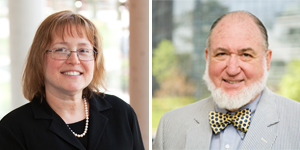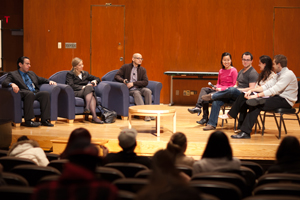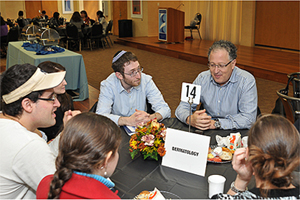

Offering Career Guidance
Einstein's CAP Offers Guidance to Future Doctors
It is easy for medical students to find they are overwhelmed by coursework, clerkships, lab work and deciding what specialty to choose. "After your second year, the pressure starts regarding focusing on your interests and figuring out which residencies you're going to be applying for," said Meagan Campol, a member of Einstein's Class of 2012 is who is pursuing obstetrics and gynecology following graduation. "It's very stressful for a lot of students, and that's where the Career Advisory Program comes into play."

Drs. Nadine T. Katz and Stephen G. Baum"While some students come to medical school knowing what they're going to specialize in, the majority are largely undecided," said Dr. Stephen G. Baum, Einstein's senior associate dean for students. "The goal of the Career Advisory Program, or CAP, is to start them thinking about the setting in which they would eventually want to practice, and to examine which career path suits their personality or lifestyle. We also aim to connect them with faculty or alumni who will help them explore these options."
Toward achieving its goal, the CAP offers numerous activities, lectures, dinners and programs, beginning during orientation and continuing throughout medical school. "Our offerings are designed to help students gain greater insights into themselves and the various specialties there are to learn about. These can be helpful to those who know what they want, as well, but who can use some mentoring along the way," said Dr. Baum.

Through Behind the Doctor’s Studio, a team of Einstein students poses questions to physicians from a variety of disciplines so that they and other students can get a complete picture of what a practice in each discipline is like and what kinds of issues each may pose."In my class and the class before me, people felt a need for more direction, like the chance to talk to attending physicians in different fields," said Evanthia Roussos, who earned both an M.D. and Ph.D. As a result, several of CAP's programs have been student-generated.
One such program developed by the office of student affairs and run by students is "Inside the Doctor's Studio" (any similarity to a famous Bravo series is intentional), where a student interviews a doctor about a specific discipline. "It's a more intimate environment, and you feel like you can ask any questions you'd like," said Ms. Roussos. "They also ask you questions like ‘do you want to be in an academic setting or private practice?'"
"We know what the work is like," added Ms. Campol. "What we don't know is what their lives are like, what happens when they go home. That's what a lot of us are more concerned about."
A recent companion to this program has been "Behind the Doctor's Studio," focusing on issues such as billing and the day-to-day aspects of running an office and the other aspects of a physician's life.
Collaborating with the alumni office, another creative and interactive CAP event is "speed networking," where students migrate among various tables in the room, each staffed by specialists in a given discipline who are either Einstein alumni or members of the faculty. After 15 minutes, a gong sounds and students move to another table.

Students learn about the field of dermatology during the Career Speed Networking event"Many students want to hear what it's like to be practicing medicine on a daily basis, or how we chose our specialty," said Dr. Philip Green, Class of 2006 and faculty alumni facilitator for the internal medicine table. The son of an Einstein alumnus who went into pediatrics, Dr. Green initially felt drawn to that field, "but as I progressed through my pre-clinical and clinical years it became clear to me that I wanted to do internal medicine and cardiology." Now a fellow in cardiovascular medicine at Columbia Medical Center, he continues to participate in CAP events. "I feel so much gratitude towards Einstein and the people who guided me early in my career," he said. "When I had an opportunity to give back, I wanted to do that."
Assisting with residency plans is another aspect of CAP. During a student's fourth year, they'll review a Medical Student Performance Evaluation. This "Dean's letter," as it's informally known, includes notes on the student's coursework, their grades and highlights of their medical school experience. It is sent to all the residency programs to which the student applies. As one of the steps to gaining a residency, it's "your big moment to shine," said Ms. Roussos.
"Dr. Baum helped with mine and, I was almost in tears when I read it. It represents my future, so to see all my accomplishments listed there, after all the hard work…it's a wonderful thing to be able to read."
Future CAP events include a fall conference on careers in academic medicine, including research, education, clinical care, diversity in the academic workforce, and mentorship. "Our aim is to be there for our students whenever they have questions or concerns, and to offer a wide variety of programs and communications through which they can learn about the many specialties available and make a decision about which one will be their best career choice," said Dr. Nadine T. Katz, senior associate dean for student academic affairs. "That way, students can make informed choices that will hopefully lead them to productive and satisfying careers."
Posted on: Monday, July 9, 2012

Tablet Blog